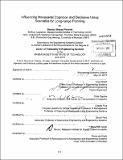Influencing managerial cognition and decisions using scenarios for long-range planning
Author(s)
Phadnis, Shardul Sharad, 1978-
DownloadFull printable version (35.74Mb)
Other Contributors
Massachusetts Institute of Technology. Engineering Systems Division.
Advisor
Yossi Sheffi.
Terms of use
Metadata
Show full item recordAbstract
This dissertation presents empirical findings related to two aspects of long-range planning: scenario planning as a planning method and cognition of planners. Long-range planning situations are encountered when designing public infrastructures (e.g. transportation systems) as well as developing strategies for corporate enterprises (e.g. firms' supply chains), due to the long implementation times and/or long lives of the invested assets. Such investments tend to have high stakes, face extreme uncertainty about the future environment they encounter, and have an open-systems nature as the implementation and operation of assets affects and is affected by the actions of many and diverse stakeholders. Three research questions pertaining to these aspects are answered in this work as three stand-alone studies. The first study (Chapter 2) examines the effects of scenario planning on long-range investment decisions made by field experts. The results of three field experiments show that experts systematically change their investment decisions and/or their confidence in them after evaluating the investments in a scenario. Field experts are also more likely to invest in flexible strategies after being exposed to multiple scenarios. The second study (Chapter 3) presents an extensive and an abridged version of the scenario creation process. Instead of seeing scenario-creation as an art, this research provides two versions of a more engineered scenario-creation process, and demonstrates their application in two separate field studies. Both versions of the process are presented with detailed instructions and rationale for performing each step. This study also provides clear definitions of the terms used in the process description and grounds them in the organizations literature. The third study (Chapter 4) explores the relationship between a manager's perceptions and beliefs about future environment, and the strategies s/he recommends. Using a prospective research design, this study first tests three hypotheses about general characteristics of managerial cognition. A closer look at different cognitive types in this data reveals unsuspected patterns in strategic thinking of managers of different types. A typology of managerial cognition is built using this inherent variation. Inductive analysis shows that managers of different cognitive types envision strikingly different types of strategies.
Description
Thesis (Ph. D.)--Massachusetts Institute of Technology, Engineering Systems Division, 2012. Cataloged from PDF version of thesis. Includes bibliographical references (p. 209-222).
Date issued
2012Department
Massachusetts Institute of Technology. Engineering Systems DivisionPublisher
Massachusetts Institute of Technology
Keywords
Engineering Systems Division.